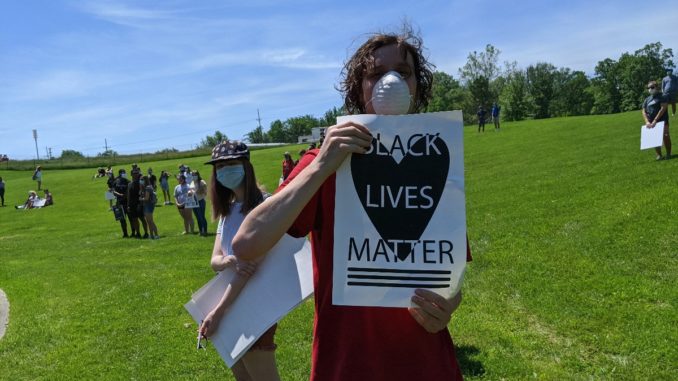
Truman State University administrators have been working to strengthen the diversity and inclusion on campus.
This action follows a petition calling for change to the racial inequality at Truman State University on June 17, a town hall meeting to address these changes in the beginning of July and a peaceful Black Lives Matter protest in Kirksville early June.
Janna Stoskopf, Vice President for Student Affairs, said she was pleased with the town hall meeting and thought the students who participated brought forth relevant and important information. She said it was important for students to have the opportunity to be heard and speak directly to administration.
The town hall meeting made Stoskopf realize how, as a campus, Truman has not fulfilled part of its mission, she said. If the University is at a point where it has to have discussions like this, Stoskopf explained, it has already failed.
“We were blind to the fact [that] we are not the institution we aspire to be or thought we were,” Stoskopf said.
Stoskopf said the administration is now acknowledging the fact that it needs to work on diversity and inclusion. According to Stoskopf, the heartfelt and personal experiences that people shared during the town hall meeting helped the administration come to this realization.
After the town hall meeting, Truman announced the hiring of Bertha Thomas, a consultant for campus diversity and inclusion.
Before the administration hired Thomas, there was only a white male in the diversity and inclusion office. That staffing decision made it difficult for students of color to ask for help or advice, Stoskopf explained.
Stoskopf said Thomas is working to help set the foundation of student support and bring in alumni to mentor students of color.
Thomas worked at Truman from 1992 as the assistant dean for multicultural affairs and the Scholastic Enhancement Experience Program until her retirement in 2014. She now has a contract as a diversity and inclusion consultant with the University until March.
Thomas said the work she will do at Truman is critical, and she is happy to do it. Lots of students, faculty and staff are working to make Truman more diverse, Thomas added.
For faculty and staff, the work begins with additional training and conversations about revisiting some curricular offerings. Thomas said she is also developing long term strategies for hiring more administration, faculty and staff of color.
Thomas has also been working with alumni of color to create a virtual mentorship for current students.
Thomas said the current climate of the world — with the inequalities associated with COVID-19, as well as the murder of George Floyd and the following protests — drove students to talk about the inequalities of race on campus.
The Association of Black Collegians presented a list of demands for change at Truman through a Change.org petition on June 17.
The petition from ABC reminded Truman’s administration about their shortcomings, Thomas explained. She said it was a really great first step to lay out some of the issues. However, the concerns from ABC are not new.
The petition states ABC created a list of demands in 1971, which was published by The Index. This list called for more scholarships for Black students, as well as a Black counselor and advisor and an end to Black academic oppression, among other demands.
“We have demonstrated, sat-in, sat down, sat around, prayed, sung and begged,” the April 1971 article published by The Index stated. “We are tired.”
The latest petition states that many of the original demands have still not been met, 49 years later. Truman has ignored the interests of Black students and actively contributes to the systemic racism which disproportionately impacts Black people today, the petition explains.
ABC member Elyse Ellis helped craft the petition because she said many people in the organization shared a feeling of stagnation from the University in respect to issues of race and ethnicity.
Stoskopf said there is now a committee, made up of faculty and a student representative, to push for more diversity and inclusion. The committee members will work to recruit and retain faculty and students of color as well as increase curricular and co-curricular culture education.
“[This committee will] work through the semester to turn the tide on the campus culture,” Stoskopf said.
Stoskopf said she is working to empathize with students and determine what factors have contributed to Truman’s problematic functions. Stoskopf said she is also working to be a role model for others by educating herself on the different experiences and perspectives Truman students have reported.
“I want [students] to know there are people here who want them here, that are willing to be their allies and want to develop a deeper understanding,” Stoskopf said.
As Vice President for Student Affairs, Stoskopf said she wants to push herself to be better connected with students of color by getting to the root of the issue.
